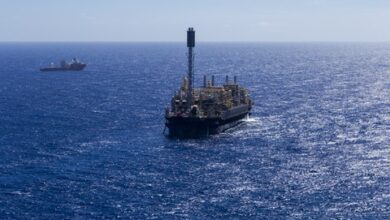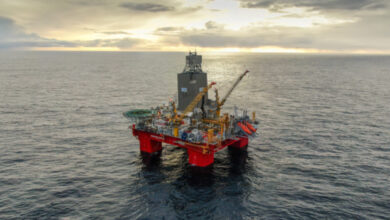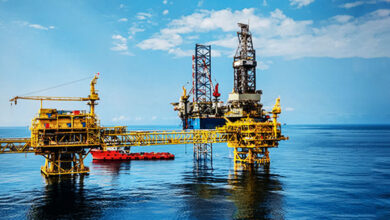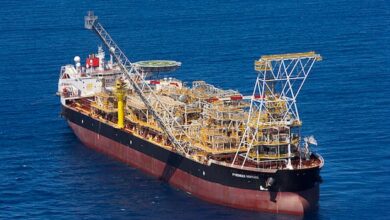Post-Macondo: ‘New normal’ still evolving

The Macondo incident may be a year behind us, but changes to offshore drilling are still striking the industry at near-breakneck speeds. For drilling contractors, the time to step up to the plate is now. “We have a choice. The new world is still in a flux and it’s not yet defined, but a lot of what it becomes is going to be either driven and defined by us – the industry – or the institutions and organizations issuing the reports and investigations,” IADC president Dr Lee Hunt said last week in Copenhagen, Denmark.
Moderating a panel session at the IADC World Drilling 2011 Conference & Exhibition that attempted to define the “new normal” for offshore drilling, Dr Hunt emphasized the importance of leadership and action from the contract drilling industry during this time of great change.
“The challenge for us as an industry is to undertake continuous improvement, to engage development and do it under our own initiatives and leadership, and at the same time work with the regulatory authorities to see that the legal frameworks we work under are consistent for all parties,” Dr Hunt said.
Panelists featured on the session were Magne Ognedal, director general of Norway’s Petroleum Safety Authority (PSA); Martin Fruergaard, chief commercial officer for Maersk Drilling; and Alan Spackman, IADC VP – offshore technical and regulatory affairs.

“The accident (Macondo) has demonstrated the need to assess a number of measures which can contribute to better management of major accident risk, with an eye to more robust solutions than what we normally have today,” Mr Ognedal told the audience, adding that the situation has roused some basic questions about offshore safety.
“If risk management has failed yet again, are there grounds for challenging the fundamental approach to risk and risk management? If management has failed yet again, are there grounds for challenging the fundamental approach being taken to management and control? And is there a need to ask other questions, assess other priority areas, rather than simply getting ‘more of the same’? These are the three basic questions we are kicking around,” he said.
The PSA report of assessments and recommendations after the Macondo incident was issued on 16 June. (The full report in Norwegian can be found here, and a PSA summary of the report in English can be found here.) Part one of the report focuses on lessons for safety and emergency preparedness in connection with drilling and well operations on the Norwegian Continental Shelf, and part two contains lessons for preventing major accidents in general for the whole Norwegian petroleum industry.
Recommendations offered under part one of the report touch on these areas:
- Well barriers;
- Well integrity – temporarily abandoned wells;
- Approach to supervisory activities;
- Blowout preventers;
- Well sealing – halting blowouts at the source;
- Control of ignition sources;
- Stability, buoyancy and ballasting;
- Emergency preparedness;
- Maintenance; and
- Organization and management.
In particular, Mr Ognedal emphasized the importance of well integrity and noted that the principle of maintaining two independent and tested well barriers must be continued, and said companies should continue to develop performance criteria for various barrier elements.
Macondo also underlined the importance of well integrity in temporary plugging and abandonment. The PSA believes that one-third of the temporarily abandoned wells on the Norwegian Continental Shelf have some sort of barrier deficiency, he said.

Providing a drilling contractor’s perspective, panelist Mr Fruergaard said Maersk Drilling welcomes the higher standards that have emerged in the drilling industry over the past year and is ready and willing to meet them. “We believe the tightening regulation will benefit the industry in the long term and that it will lead to safe and more efficient drilling. As a drilling contractor, we welcome the tightening safety regulation and expect to see an increasing demand from oil companies for modern equipment with good safety procedures.”
He noted that competency and a robust maintenance program are key customer requirements Maersk is working to satisfy. For example, Maersk now requires verification that the BOP remains as originally designed for its original use, Mr Fruergaard said.
He also believes that aspects of well control training have not kept pace with the industry’s move into deeper waters. To address that challenge, Maersk has developed in-house deepwater well control training using simulators that put senior drill crews in real-world case study situations.
In the legal and contractual realm, Mr Fruergaard warned that insurance premiums have risen 20% to 25% and may rise even further, a cause for concern. On the other hand, he doesn’t see much impact from Macondo on force majeure provisions in drilling contracts, but noted that there are some new considerations to be taken, “in particular the period of time before termination right is triggered.

The final panelist of the session, IADC’s Mr Spackman, provided a bird’s eye view of the host of industry and government responses to the Montara and Macondo incidents that have emerged in the past year. On the government/regulator side, a dozen or so “final” reports have either been released or are due soon, most of which will incite further work and changes for offshore drilling. “There is a lot going on, and the new normal is still evolving,” he said.
Providing an overview on API standards development since Macondo, Mr Spackman noted that API RP 65-2 (“Isolating Potential Flow Zones During Well Construction”) has been issued since last December while API RP 96 (“Deepwater Well Design Considerations”) is due to be balloted later this summer.
API Standard 53 (“Blowout Prevention Equipment Systems for Drilling Operations for Drilling Operations”) has been changed from an RP to a standard because it’s anticipated that it will be incorporated into regulations issued by the US Bureau of Ocean Energy Management, Regulation and Enforcement (BOEMRE). “It’s a substantial rewrite of the old RP 53 with a lot of added meat,” Mr Spackman said.
Additionally, API and IADC are jointly issuing Bulletin 97, primarily an interface document between the drilling contractor and lease operator. It is expected to go to ballot later this month. “We are very well aware that it has been tailored for US-specific concerns, and it’s going to need to be looked at by other national oil and gas associations along with contractors working in any particular area in order to tailor it to their use. … We’re happy to help anyone in an operating region if you need to develop national guidance,” he said.
In Australia, the National Offshore Petroleum Safety Authority is expected to come out with “a whole new suite of new regulatory initiatives over the course of the next year” as a result of the Montara incident. And in the US, BOEMRE is expected to next turn its attention to SEMS 2, a refinement of its safety and environment management system regulations, as well as to further requirements for blowout preventers, Mr Spackman said.




